There are a number of obvious differences when comparing asparagus vs broccoli, but do you know all of them? Whether you are an avid home chef, want to grow vegetables, or simply have an invested interest in asparagus and broccoli, there’s plenty to learn about these powerhouses. But in what ways are they similar, and in what ways are they different?
In this article, we will compare and contrast both broccoli and asparagus so that you can fully understand what makes these two vegetables unique. In addition to describing their physical appearances in detail, we will also go over their many uses and tastes. Let’s get started and learn all about asparagus and broccoli now!
Comparing Asparagus vs Broccoli
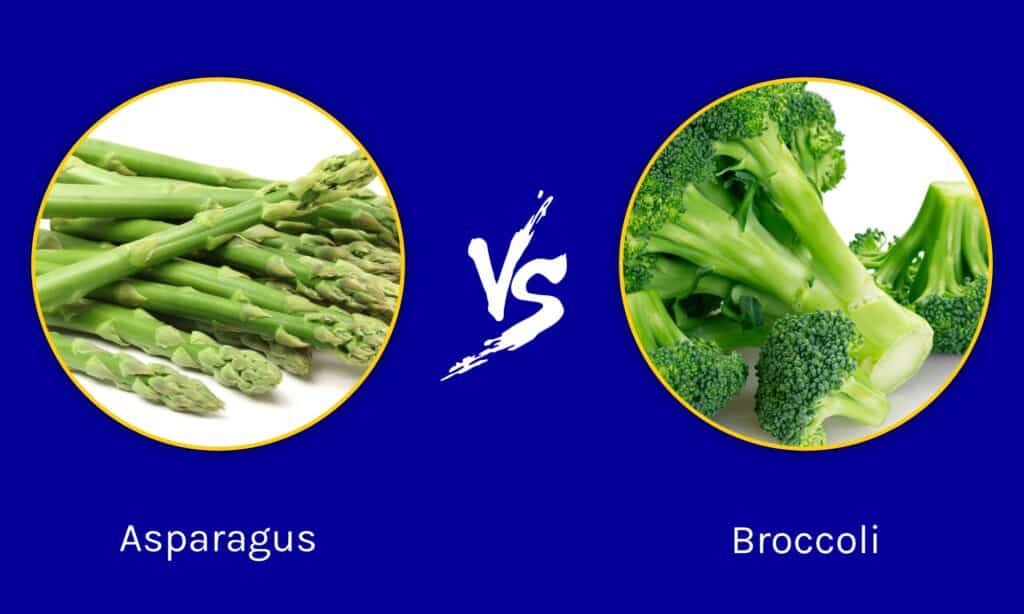
| Asparagus | Broccoli | |
|---|---|---|
| Classification | Asparagus officinalis | Brassica oleracea var. italica |
| Description | Thin stalks with a feathery top, ranging in thickness. Comes in a variety of colors including white, yellow, and various shades of green. Often described as spears, though they can grow in the ground in clusters. | Thick stemmed with a flowering, sponge like top. Comes primarily in green, though the leaves are sometimes gray in appearance, and you can find purple varieties. The top of broccoli plants flower, but most broccoli is consumed when the bulbs are green and closed. The entire plant is edible. |
| Uses and Nutrition | Many culinary uses, including raw, grilled, and roasted. Very low calorie but still packed with nutrition, including iron, fiber, and a number of vitamins. | Extremely popular vegetable, used in a variety of applications. Often eaten raw, roasted, or in soups. Low calorie food option full of vitamins and some protein nutrition. |
| Hardiness Zones | 3-8 | 2-11 |
| Taste and Texture | Crisp snap leads to an earthy, clean taste. Can get woody when overripe or overcooked, but tender asparagus is full of flavor. | Stems and florets have very different textures, though they are mostly firm. Peppery taste, but mild enough to appeal to many different people. |
Key Differences Between Asparagus vs Broccoli
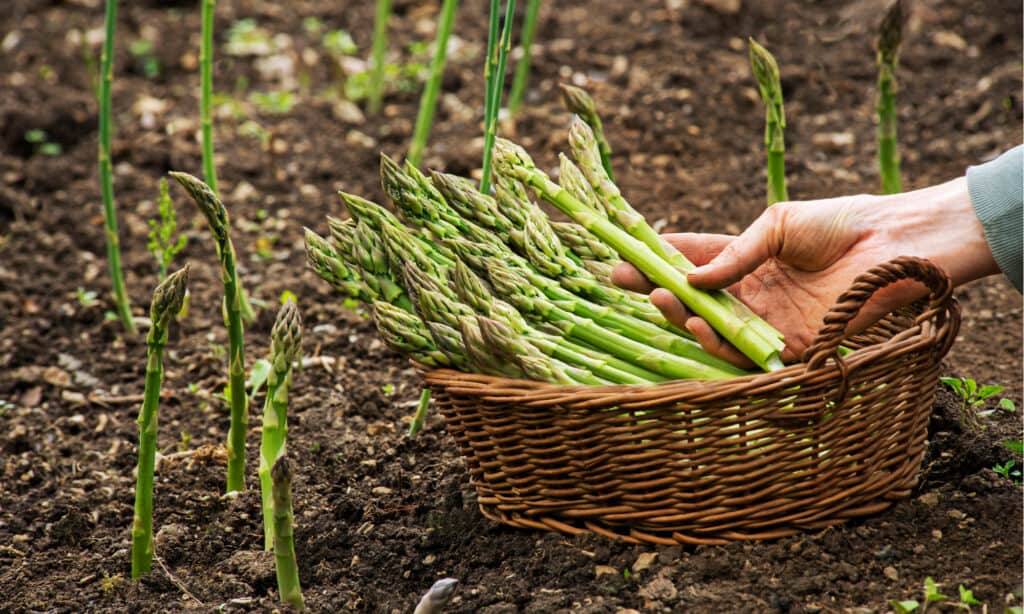
The flavor of broccoli is more reminiscent of pepper compared to the clean, earthy taste of asparagus.
©DUSAN ZIDAR/Shutterstock.com
There are a number of key differences between asparagus and broccoli. For example, asparagus and broccoli are from very different families, as asparagus has its own family and broccoli is a member of the cabbage family. In addition, asparagus comes in a few different colors, while broccoli is primarily green. The flavor of broccoli is more reminiscent of pepper compared to the clean, earthy taste of asparagus.
Let’s go over all of these differences and more in detail now.
Asparagus vs Broccoli: Classification
One of the primary differences between broccoli and asparagus has to be their classifications or scientific families. Asparagus belongs to a family all on its own, while broccoli is a member of the cabbage family. Specifically, broccoli belongs to the Brassica oleracea var. Italica family, while asparagus belongs to the Asparagus officinalis family.
Asparagus vs Broccoli: Description
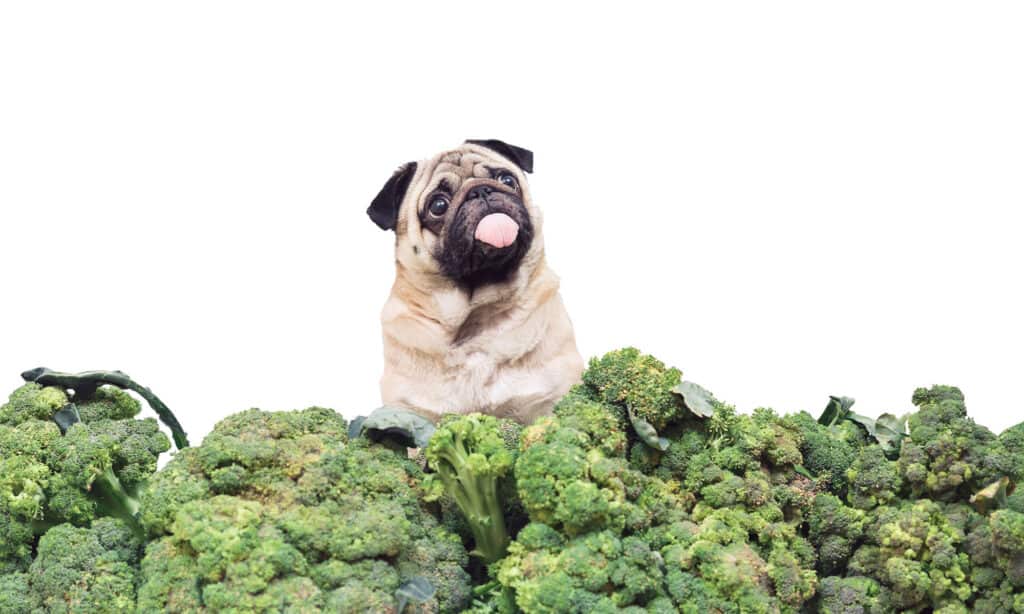
Asparagus can be found in green, white, and yellow varieties, while broccoli is notoriously green.
©MarinaVarnava/Shutterstock.com
If you look at asparagus and broccoli side by side, their physical descriptions are extremely different from one another. For example, asparagus grows in a thin, stalk-like form, while broccoli grows as a thicker stalk with a larger, flowering head. In addition, asparagus can be found in green, white, and yellow varieties, while broccoli is notoriously green. However, there are some purple varieties of broccoli, though they are relatively uncommon.
Broccoli florets are much larger than the tips of asparagus spears. In fact, asparagus looks like it has feathery leaves from top to bottom, while broccoli has a very distinct separation between the stem and head. Finally, broccoli plants produce a number of leaves surrounding the head of the plants, while asparagus spears sprout from the soil fully formed.
Asparagus vs Broccoli: Uses and Nutrition
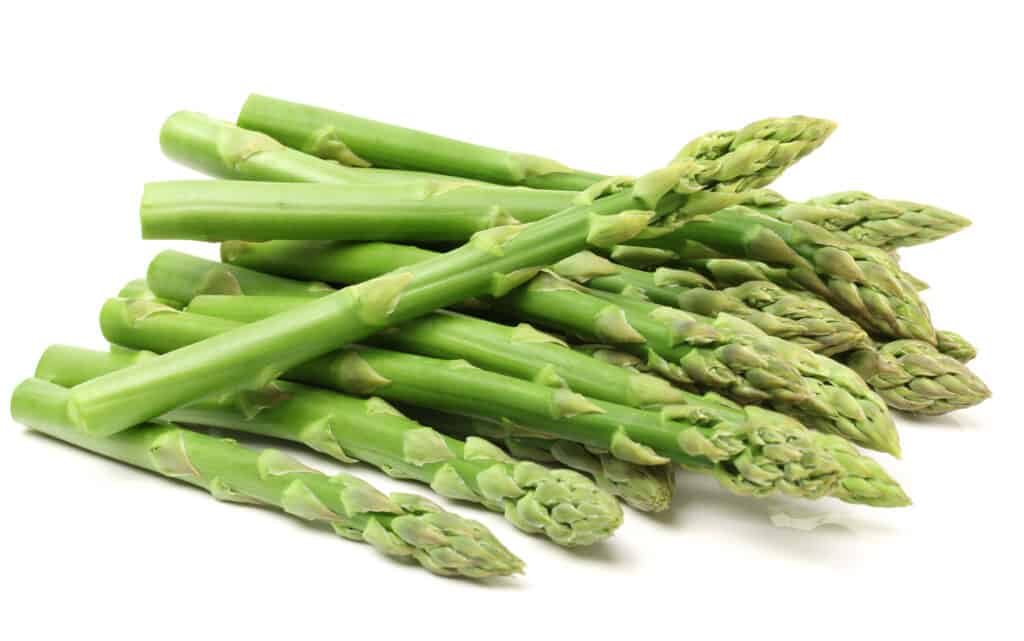
Asparagus grows best in hardiness zones 3 through 8, while broccoli grows best in hardiness zones 2 through 11.
©zcw/Shutterstock.com
While asparagus and broccoli are extremely popular green vegetables, they vary in their nutritional substances and uses. For example, asparagus is commonly eaten raw, grilled, or roasted, while broccoli is commonly eaten steamed or in a variety of other forms. In fact, broccoli is more commonly used compared to asparagus, likely due to the fact that it is more likely to be available year-round.
In addition, asparagus is a great source of iron and a number of different vitamins, while broccoli is a low calorie vegetable that still offers some level of protein. Both of these foods are recommended for low calorie diets, the asparagus is lower in calories compared to broccoli. Given that the flavor of both of these vegetables is relatively neutral, you can eat them in a variety of settings!
Asparagus vs Broccoli: Hardiness Zones
Asparagus and broccoli have different hardiness zones that they are capable of growing in, the broccoli has a longer growing season compared to asparagus. The hardiness zones illustrate this as well: asparagus grows best in hardiness zones 3 through 8, while broccoli grows best in hardiness zones 2 through 11.
Asparagus vs Broccoli: Taste
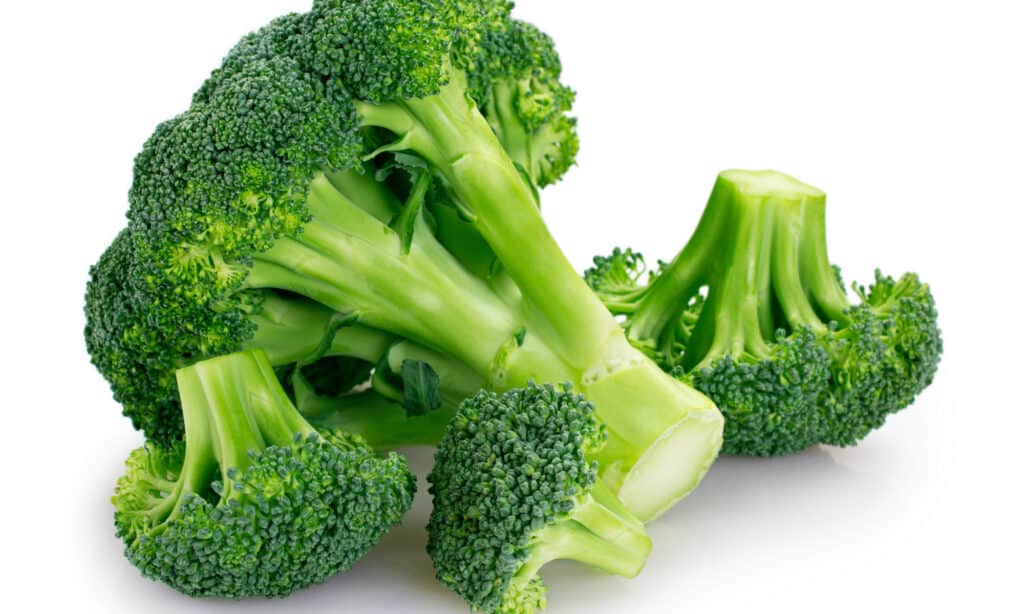
The light and earthy flavor of asparagus may not be as appealing as the flavor of broccoli, especially among young children.
©Valery121283/Shutterstock.com
A final key difference between asparagus and broccoli has to be their tastes. While both of these green vegetables have a flavor that appeals to a wide variety of people, the flavor of broccoli is more peppery compared to the flavor of asparagus. The light and earthy flavor of asparagus may not be as appealing as the flavor of broccoli, especially among young children.
In terms of their textures, asparagus is much more woody compared to the tender broccoli plant. However, it all depends on how you cook both of these vegetables. The heads of broccoli are much softer and sponge are compared to the relatively firm texture of asparagus.
The photo featured at the top of this post is © DUSAN ZIDAR/Shutterstock.com
Thank you for reading! Have some feedback for us? Contact the AZ Animals editorial team.






